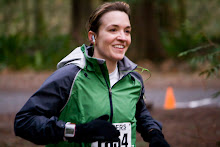 Observe, if you will, the red-turning-blue bruising on my left ankle. This is what happens when you take a tumble off a sidewalk during a half marathon, which is what I did yesterday.
Observe, if you will, the red-turning-blue bruising on my left ankle. This is what happens when you take a tumble off a sidewalk during a half marathon, which is what I did yesterday.I had run up the monster hill that is 132nd in Kirkland. We were in the Bridle Trails neighborhood, and I could see the 7-mile marker up ahead. I was running on the sidewalk (first mistake), and I glanced at my watch. I noticed that I was running about 2 minutes faster than my PR time, and I started fantasizing about the finish. I wasn't watching where I was going and I missed the sidewalk as we crossed the street.
I felt and heard my ankle crack as I came down on my left foot. The runners and race monitors groaned collectively. A guy came over and asked, "Do you need a medic?" I was still surfing waves of pain, so I shook my head and said "I don't know."
The medics were coming anyway. Two guys raced over to me and had me sit on the curb, all the while talking to me in soothing tones. I took off my shoe and they iced the foot, then wrapped it in a compression bandage. I watched people racing past and figured I wasn't going to finish this one. My parents, who had never seen me race, were at the finish line with Steve and Bini. I swore under my breath.
"Do you want me to call someone for you?" asked one of the medics, the one with a beard. I didn't know yet.
"What happened?" asked the other, cuter medic. (You're never too injured to notice these things.)
"I was flying along, making good time, and I missed the sidewalk," I said.
"Oh, I'm so sorry," he replied.
"It happens," I shrugged, trying to sound matter-of-fact. In truth, I felt disappointed and angry at myself.
They helped me stand up and I stood, then walked on the ankle. Surprisingly, it felt OK. "I wonder if I could finish?" I asked.
They suggested I run a bit to test it out, which I did. "It feels OK," I told them. "I'm going to try it."
"Are you sure? We're the last medics on the course," said bearded guy.
"Yeah -- there's people all along the course. Someone will help." I was desperate to get going, to not lose my nerve.
The medics must have known better than to argue with a crazy runner. "OK, but you're not running for time," they warned.
"Right. I'm just running to finish." I thanked them and jogged off. The course was now downhill, and I was drafting off momentum and adrenaline. I'd lost about 10 minutes, but I was going to tough it out. I wasn't going to quit. I'm an athlete.
These were the mantras that kept running through my head as I ran miles 7 through 13.1. I kept checking in with my ankle, trying to gauge the pain level. It was always manageable, and I called on different body parts to pick up the slack. I ran softer on my feet, asking my knees to absorb more of the impact.
At mile 11.5, my knees started to protest. I popped an Aleve and willed my body to hang in there for just a few more minutes. I'd come this far -- I wasn't going to stop. I tried to pick up my pace, if for no other reason than that if I went faster, I'd be done faster (this is how a crazy runner thinks). My official time was 2:19, about 12 minutes off what I'd predicted before my fall. I saw my parents, my son and Steve and the first thing I said was: "I took a tumble."
As the day went on, my ankle swelled up and up and up. It was fascinating to watch, but also scary. All of my other running-related injuries -- hip bursitis, plantar fasciitis, piriformis syndrome, strained Achilles -- had been invisible to me. I could feel them, but I couldn't see them. But my ankle was turning red and purple and blue, a Technicolor testament to how far I'd pushed myself in order to finish the race. Had I done permanent damage? Had I broken something? How would I care for my active toddler?
Today, my podiatrist took some X-rays and assured me that I haven't broken any bones. He also said that running on my ankle probably didn't worsen the injury (although it worsened the swelling). But it's amazing to me that I just lose my common sense when I'm running. So many of my injuries have occurred when I pushed through pain. What is it going to take for me to finally listen to my body?
